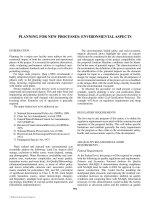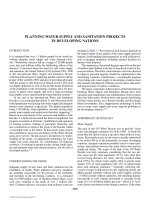theme park resorts business planning for new and expansion projects
Bạn đang xem bản rút gọn của tài liệu. Xem và tải ngay bản đầy đủ của tài liệu tại đây (7.68 MB, 59 trang )
Theme Park Resorts:
Business Planning for
New and Expansion Projects
- Hand-Out Version
Michael Kreft von Byern,
Representative of the Board,
Europa-Park, Germany
Marcel Hatt, Managing Partner,
Maxmakers Ltd, Switzerland
November, 2013
Content
1.
2.
3.
4.
Introductions
Planning of New Projects
Europa-Park Resort Development
Conclusions
The Mack factory founded in 1780
in the Black Forest, Germany
Carousel construction
The first portable wooden coaster 1921
235 years later Mack Rides today
Europa-Park: Opening Day 1975
How did Europa-Park develop?
1780 The early beginning
1973 The idea and start of construction
1975 Opening with Europe as a theme
1981 From amusement park to theme park
1995 From park to resort
2020 From resort to global destination?
Europa-Park 2013
Integrated Business
Planning
for Leisure
Destinations
Maxmakers at Glance: Business Planning for Destinations
• Supporting clients in identifying the best
project vision, and then helping them in
realizing it
• Maximizing mixed-use developments
• Bringing together the worlds of ‚real estate‘
and ‚entertainment‘
• Combining international best practices
and local expertise (with local partners)
• Business driven approach: first define the
"what" questions (strategy/concept) and
then integrating the "how“ questions (with
design partners)
• Services throughout the entire project life
cycle
• Facilitation of project partners
Optimizing the concept
Maxmakers:
We are helping our
clients to frame their
project - and then
supporting them
to fill that frame.
Competence Areas: Destinations as Primary Focus
Destinations
• Entertainment
•
•
•
•
•
destinations, e.g.
Theme & Water
Parks
Shopping-tainment
Edu-tainment
Nature destinations
Sports destinations
Tourism
destinations
• City destinations
City & Cluster
Developments
• Industry clusters,
•
•
•
•
Health Projects
• Wellness hospitality,
clinic projects
• Sports/ health
centers
• Modern retirement
housing/ living
developments
special economic
zones
Knowledge hubs,
science cities, and
campuses
Commercial
mixed-use
developments
New city centers,
e.g. central stations
District & industrial
revitalizations
Masdar
Skolkovo
Sharjah, UAE
Regional & Real
Estate Strategies
• Regional development
• Tourism development
• Project
re-animation
• Property portfolio
assessments
UN, Vietnam
Leisure Destinations
• In many global markets the desire for entertainment is
increasing -> applied in many project variations
• Competition is intensifying – also in the face of ever
increasing guest expectations
• Based on systematic development methods we conceive
with our clients a well-balanced, synergistic usage mix and
a differentiated guest experience
Sports Destinations
• Adding life to the projects by introducing partners, experts,
operators and co-investors
• This results in improved repeat visitor rates, increased
revenue, higher returns and lower risks
Tourism Destinations
Entertainment
Edu-tainment
Shopping-tainment
City Destinations
Nature Destinations
Leisure Destinations: Project Examples
"Swiss Village" Integrated Leisure Destination, China
"Sochi Park" Theme Park Resort, Russia
Theme Park Resort, Azerbaijan Moscow Stadium Destination
Strategy, Russia
Prime Minister Vladimir
Putin inspecting the
project
Maximizing Project Value: Client Benefits
• Stronger competitive
positioning
Value Creation Potential from Maxmakers Approach
• Greater synergies and
operating margins
• Risk diversification
• Improved chances of financing
and realization
• Higher investor returns
With early and smart planning we generate substantially
increased project value: through revenue generation
and cost savings.
Content
1. Introductions
2. Planning of New Projects
2.1. Integrated Business Planning
2.2. Commercial Destination Planning
3. Europa-Park Resort Development
4. Conclusions
"In the long run, you
only hit what you aim
at."
Henry David Thoreau
The Case for Integrated Business Planning
Business Planning – Global Practices
Comparison
• Most advanced businesses and industries
are managed by ‘facts & figures’ and modern
management methodologies; this also applies
to professional entertainment venue operations
• However: with regards to new projects the
Entertainment sector often functions differently:
In almost all industries new projects are started with a commercial idea
followed by a first business plan (e.g. in the Silicon Valley for VC’s):
− A business plan covers all relevant project planning dimensions –
from the market analysis, the derived strategy and product
definition, the financial planning, the marketing, operations
planning, etc.
− Business plans evolve with continued planning efforts and become
more detailed and accurate
− One of the key differences to standard entertainment ‘feasibility
studies’, lies in the systematic strategy & concept development
process
Observation: New Theme Park Projects
are often dream-driven!
Evidence > IAAPA slogan: Imagine the possibilities
But what is really different in entertainment?
• Targeting children
• To excite guests, fantastic experiences and
inspired story-telling are needed; this requires
creativity, not accounting
• Anticipating consumer behaviour is science
and an ‘art’
The Case for Integrated Business Planning
Entertainment Project Planning Approaches
In the entertainment industry new projects often start with a
‘dream’:
− The process is often started with creative designers
who shall ‘translate’ the dream into a plan/visual;
often this process is rather ‘design’ and ‘fantasy’ driven
(not on market research/facts).
− At some point the project is taken for a feasibility study
(often even by auditing firms with limited industry
understanding); in many cases the initial plans must then be
revised (to prepare for financing)
− Sometimes further market studies are done, but often times
no consistent business plan including all planning dimensions
is produced (as in other industries)
What we sometimes also see: some more finance oriented project
initiators start with a feasibility study for their given vision, and only
if they get the desired confirmation, they proceed to masterplanning; but also this approach is missing out on the systematic
strategy review process (e.g. questioning the initial vision)
I
S
S
U
E
S
The Case for Integrated Business Planning
Negative Consequences of Traditional Planning Approaches
• The results of approaches with subsequent planning steps are often
not consistent (numbers, plans, etc don’t match) - which requires
extra efforts by the developer to align results
The traditional approaches are not efficient and not effective:
• Not efficient: more iterations, time and investment is needed
• Not effective: without the necessary strategy/concept and market
entry optimization process the business results are not as good as
they could be:
Not optimized profit
No deliberate project risk mitigation
Lower chances to find financing
• Conclusion:
By comparison to a standard business planning
process the traditional park planning approaches are
spending more resources for less output/results
The Case for Integrated Business Planning
Industry Specific Solution
Solution:
• Taking the general business planning methodologies as base
and adjusting it to the specifics of the entertainment industry
• This means - Beginning the project with a business planning
phase, which is integrating all relevant planning dimensions:
Initial working steps include the necessary business
planning ‘homework’ (assessments of market,
situation, etc.)
Then a strategy finding process is applies including
scenarios development and evaluation
This process shall combine ‘business experts/business
creativity’ and ‘experience experts/ design creativity’
Once the project/product strategy/concept is
determined, the following business- and masterplanning steps follow concurrently > this way project
optimization iterations can occur and the results will be
consistent (plans and numbers aligned) as it is all
consolidated at the same time
Review by investor’s/ bank’s trusted advisor
The Case for Integrated Business Planning
Business Planning Logic
Selected Key Questions
Situation Analysis
• What is the project’s context and the relevant
market factors?
What is the core project vision?
What are the key business drivers?
What is the strategy and distinct project positioning?
Who are the target clients, and how can they be best
attracted and served?
• Which strategy and concept best integrates all
circumstances and business objectives?
•
•
•
•
Project Strategy
Project Concept
• What are the key program elements?
• What is the optimal usage mix and how do the various
program elements best exploit synergies?
• Which elements drive commercial viability?
• What is the appropriate project sizing and staging?
Project Program
Program
Element 1
Program
Element 2
Etc.
• How should the main components be specified?
• What are the key requirements & guidelines for the
development design planning?
• How are those program elements best realized and
Masterplanning
& Design
Operational &
Financial Planning
Integrated
Business Plan Report
functionally allocated in the given site conditions?
• What operating performance can be expected?
• What are the necessary operational considerations?
• What is the approximate budget and derived
investment need , and how attractive is the investment
case?
• How to go to market and run the project?
Commercial Destination Planning









